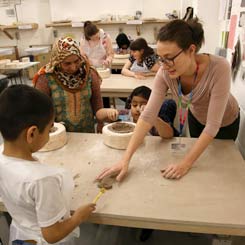Important preliminary note, 2022
As envisaged for the last 2 years, we have reviewed our geographical eligibility criteria and have introduced new ones.
We no longer operate a 2-test process (that eligibility depends on satisfying 2 criteria: one based on counties and the other based on postcode areas). We have replaced it with a single test based on postcode districts. As indicated on the home page, the new test significantly reduces our geographical area (although we expect there to be only a very limited effect on postcode areas B and WS).
Eligibility criteria

mac birmingham Disabled Access Day 2017, a celebratory day of events and activities for all ages and abilities. Photo: Nick Hynan
As a general policy The Saintbury Trust will only accept applications for grants from registered charities that are both based and operate (wholly or mainly) within its geographical area (see next paragraph). For our purposes, a charity is “based” where its main office is located or where its principal activity is performed (and often a combination of the two).
To be within our geographical area a charity must be within one of the listed postcode districts of the following postcode areas:
- B: all except districts 77, 78 and 79
- CV: 1 to 8, 31 to 37
- DY: 1, 2 and 4
- GL: 1, 3, 4, 20, 50 to 53, 55 and 56
- WR: 1 to 5, 7, 9 to 12
- WS: 1 to 5, 9 and 10
- WV: 1, 2, 12 1nd 14

Birmingham Royal Ballet’s Dance Track Celebration, July 2018. Photo: Paul Telfer.
We do not make grants to:
- Individuals (including individuals seeking sponsorship for challenges in support of charities)
- Animal charities
- Charities whose purpose is the advancement of religion. Whilst we normally accept self-categorisation (see below) we reserve the right to re-categorise an applicant within this category if we, in our absolute discretion think fit
- Organisations other than registered charities (except, at the trustees’ absolute discretion, where charitable status is otherwise proved to the trustees’ satisfaction; the trustees are not prepared to undertake their own investigations)
- National charities – this includes charities based within our geographical area but which operate on such a wide basis that they should be considered “national”. We do not insist that applicants operate exclusively within our geographical area but the trustees will decide in their absolute discretion as to whether a charity in these circumstances satisfies our criteria. Please note that many national charities apply to us on the basis that they have a project within our geographical area; they do not satisfy our criteria
- Local branches of national charities – except where they have a separate registration with the Charity Commissioners and can provide their own accounts.
- Scouts, guides, sea-cadets and similar organisations
- Village halls (including refurbishment and improvements)
- Repair, maintenance, improvement etc. of local churches.
We rarely award grants for general running costs or for start-up (or “seed-corn”) costs. We always require sight of least one full year’s accounts. These accounts must cover a period commencing on or after the date you have registered as a charity; we do not accept accounts which cover periods before this date.
We do not consider applications from the same applicant at successive meetings.
Save for the advancement of animal welfare and the advancement of religion, we, in general (but see below), accept applications relating to any of the purposes set out in section 3(1) of the Charities Act 2011. These are summarised below. We have added our own code letter for each purpose as, on the application form, you will be asked to specify the category (or main category) under which your application falls.
The categories are (and this is how they appear in the Act – with the exception of 11 which has been shortened):
1. The prevention or relief of poverty (“POV”)
2. The advancement of education (“EDU”)
3. The advancement of health or the saving of lives (“HEAL”)
4. The advancement of citizenship or community development (“CCD”)
5. The advancement of the arts, culture, heritage or science – which we subdivide into:
(a) Arts and culture (“A&C”)
(b) Heritage and science (“H&S”)
6. The advancement of amateur sport (“AMS”)
7. The advancement of human rights, conflict resolution or reconciliation or the promotion of religious or racial harmony or equality and diversity “HUM”)
8. The advancement of environmental protection or improvement (“EPI”)
9. The relief of those in need because of youth, age, ill-health, disability, financial hardship or other disadvantage – which we subdivide into:
(a) Care of the dying (“N-COD”)
(b) Childhood and youth (“N-C&Y”)
(c) Community (“N-COMM”)
(d) Disability and ill-health (“N-DIS”)
(e) Homelessness (“N-HOME”)
(f) Old Age (“N-OA”)
10. The promotion of the efficiency of the armed forces of the Crown or the efficiency of the police, fire and rescue services or ambulance services (“PUB”)
11. Any other purposes which fall within paragraph (m) of the said Section 3(1) (“ONS”).
In line with common practice the trustees expressly reserve the right to make grants at their absolute discretion to charities which do not appear to come within the above-mentioned eligibility criteria. The trustees do not expect to exercise this discretion save in rare circumstances.
If you are eligible, apply for a grant.
